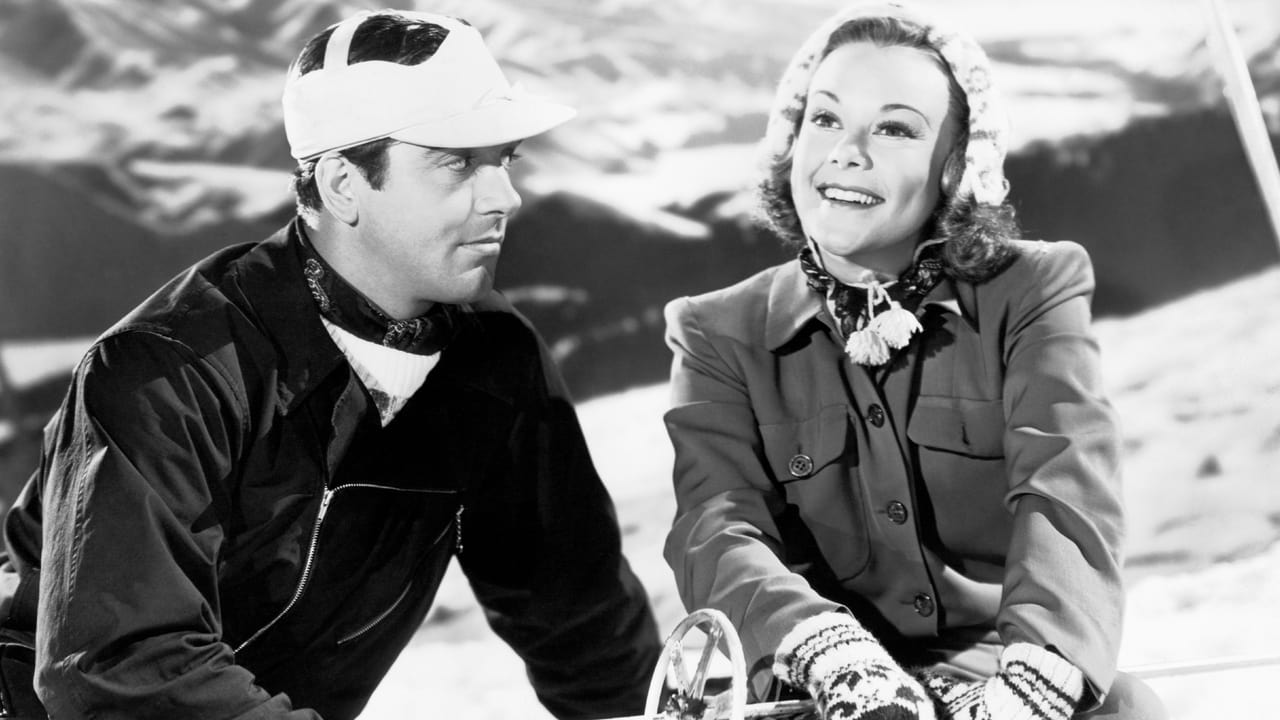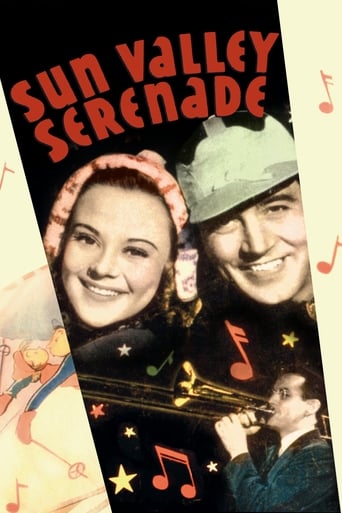

This very agreeable romantic musical comedy from 1941 links two seemingly incompatible elements, both very popular at the time it was filmed: Sonja Henie's ice skating and Glenn Miller's big band jazz. It's admittedly fluffy, but is also very hard to dislike.The slim plot of sorts: Ted (John Payne), a pianist in a struggling jazz big band headed by Glenn Miller (though he is given another name here), has volunteered for publicity reasons to take a refugee from war torn Norway. He expects to get a small child, but she gets the grown, beautiful Karen Benson (Sonja Henie). Karen is too eager to get involved romantically with Ted, the problem is he already has a girlfriend, the temperamental Viv (played by Lynn Bari), who is also a singer with the band. Henie's character is just short of grating - we are supposed to find her a sympathetic character, and mostly we do, even as she tries to steal a man from other woman. When Ted and Viv goes to the ski resort of Sun Valley for a performance there in the middle of the winter, Karen decides to join them hiding in the train with the help of the band manager (Milton Berle).Of course more than the plot, the important thing here is the music (In the Mood and Chattanooga Choo Choo are some of the pieces included) and Henie's skating. There is also a nifty prolonged scene of Henie pursuing Payne in skis (even if the close ups were obviously filmed in studios, and doubles were used in distant shots).
... View MoreI remember seeing this film as a kid and being impressed that it was one of the most fun movies not directed primarily at children. Finally, I got a video copy and play it every Christmas season. If a musical romantic comedy is what you are in the mood for, this is one of the best, from a time when these were churned out in sizable numbers, serving to entertain the GIs far from home, as well as the home crowd. How could you miss with such talents as Sonja Henie, the Glenn Miller Orchestra, John Payne, Lynn Bari, Milton Berle, the Nicholas Brothers, and Dorothy Dandridge. Most of the action and some of the filming takes place at the Sun Valley ski resort in Idaho, developed only a few years before this film was made. I've seen clips of a few other films including Sonja,the reigning ice queen of the times, and this is by far her most entertaining performance. While Berle is trying to romance her, she definitely has her eye on a reluctant John Payne, who becomes engaged to the band's singer, played by perennial loser Lynn Bari. Payne was often paired with Betty Grable or Alice Faye in their 20th Century Fox musical romantic comedies of this era. Fox again paired Payne and Sonja in the film "Iceland". I haven't seen it, but apparently there was too much ice skating and too little development of the romance. It fell flat compared to the present film.Of course, the Glenn Miller orchestra added much to this film. They performed several of their classic numbers. In addition, several new songs were composed for this film by the prolific tunesmith Harry Warren and his then lyricist Mack Gordon. Their collaboration produced such memorable songs in this film as "It Happened in Sun Valley", "I Know Why", "Chattanooga Choo Choo" and "At Last". Unfortunately, the vocal version of the latter was cut, apparently to shorten the film; but Sonja and her retinue skated to the tune near the end of the film. The vocal version was resurrected in the second Fox film featuring the Miller orchestra, "Orchestra Wives", which also introduced the Warren-Gordon song "Serenade in Blue". Chattanooga Choo Choo" would go on to become the first certified Gold Record, with more than 1 million sold in the first year.. Ironically, when the Miller orchestra first practiced this song, they generally were not impressed with its potential. Surprisingly, at the Harry Warren web site, where browsers can choose to hear renditions of many of his songs, spanning from the 1920s to the 1950s, the most requested song is "At Last", which I would rate as #10, at most.The comedy content of this film was carried by several of the principles. This was supposed to be the forte of Berle; however, his chief talent seemed to be smoking cigars. I would have much preferred Bob Hope or Jack Oakie, for example. That would have made it just about a perfect film. Miller was rather stiff off the bandstand, not surprisingly. Like the Cheshire Cat, Sonja kept popping up unexpectedly, scheming how to land her chosen man before he became unavailable. Her frequent Cheshire Cat-like smile belied her need to act fast. The chemistry between Sonja and Payne appeared to be very good, her impishness serving to loosen up his typical serious demeanor.3/17 update : Now available at YouTube, along with "Orchestra Wives"
... View MoreThis was my first Sonja Henie movie which was reissued in support of House on 92nd St and what a great piece of entertainment that was! Of course we had been saturated with the great WW2 bands courtesy of AFRS/AFN including Miller's and it was great to see them all and those popular tunes against such an attractive background. "I Know Why" still remains my favourite recording with "Chattanooga Choo Choo" and "Moonlight Serenade". However, hard as I tried,I really could not accept the 30 year old strapping blonde & dimpled Sonja as an innocent little refugee and neither did Lynn Bari who was Hollywood's definitive gorgeous bitch. It wasn't her singing voice any more than in the later equally enjoyable "Margie" but it didn't matter & who cared? I never quite took to Joan Davis - she seemed too much like Martha Raye/Cass Dailey/Eve Arden/Zazu Pitts. The back projection for the hill skating sequences was too obvious but I would love to know how they managed to get that immaculate black mirrored effect to the huge rink. Much like those impossible dance floors in some of the Astaire/Rogers spectaculars. The Nicholas Bros were nothing less than sensational & an unknown young Dorothy Dandridge did well in her early brief appearance. Glenn Miller on the other hand may have played a cool slush pump but he was no actor! And there were always the real Modernaires. And all this without a hint of smut or sex. Best line - when Lynn Bari in the night club sequence in a fit of jealousy rounds on Henie and calls her a hillbilly and the latter with an expression of total bewilderment retorts "Hillbilly?" Well,I thought so.Both Joan Davis & Milton Berle made it to early 50s TV - the latter becoming known as "Mr TV" from his prolonged popularity & brashness. He even made it into the early 90s in one of his last guest bits for one of Fran Drescher's hilarious "The Nanny" episodes as a shyster lawyer.
... View MoreJohn Payne, one of those often underated actors who turn up with regularity in the 1940s, makes a good partner for the sensuous Sonja Henie in this entertaining big band romp in the snow. I've lost count of the number of times I've watched this movie but still delight in the sight and sound of the race down the mountain and of course the brilliant Nicholas Brothers. A good supporting cast and faultless production values makes this movie one to remember.
... View More